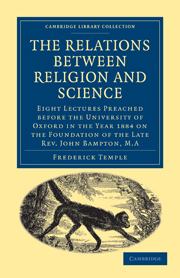 The Relations between Religion and Science
The Relations between Religion and Science Published online by Cambridge University Press: 29 August 2010
‘So God created man in His own image, in the image of God created He him.’
Genesis i. 27.RELIGION and Science both begin with the human will. The will is to Science the first example of power, the origin of the conception of cause; the bodily effort made by the will lies at the root of the conception of force. It is by comparing other forces with that force that Science begins its march. And the will is to religion the recipient of the Divine command. To the will the inner voice addresses itself, bidding it act and believe. It is because we have a will that we are responsible. In a world in which there were no creatures endowed with a will, there could be no right-doing or wrong-doing; no approval by conscience and no disapproval; no duty and no faith.
Here is the first possibility of collision between Science and Religion. Science postulates uniformity; Religion postulates liberty. Science cannot ever hope to reduce all phenomena to unity if a whole class of phenomena, all those that belong to the action of human will, are to be excluded from the postulate of invariable sequence. The action of the will is in this case for ever left outside. The evidence for the absolute uniformity of nature seems to be shaken, when it is found that there is so important a part of phenomena to which this law of uniformity cannot be applied.
To save this book to your Kindle, first ensure [email protected] is added to your Approved Personal Document E-mail List under your Personal Document Settings on the Manage Your Content and Devices page of your Amazon account. Then enter the ‘name’ part of your Kindle email address below. Find out more about saving to your Kindle.
Note you can select to save to either the @free.kindle.com or @kindle.com variations. ‘@free.kindle.com’ emails are free but can only be saved to your device when it is connected to wi-fi. ‘@kindle.com’ emails can be delivered even when you are not connected to wi-fi, but note that service fees apply.
Find out more about the Kindle Personal Document Service.
To save content items to your account, please confirm that you agree to abide by our usage policies. If this is the first time you use this feature, you will be asked to authorise Cambridge Core to connect with your account. Find out more about saving content to Dropbox.
To save content items to your account, please confirm that you agree to abide by our usage policies. If this is the first time you use this feature, you will be asked to authorise Cambridge Core to connect with your account. Find out more about saving content to Google Drive.